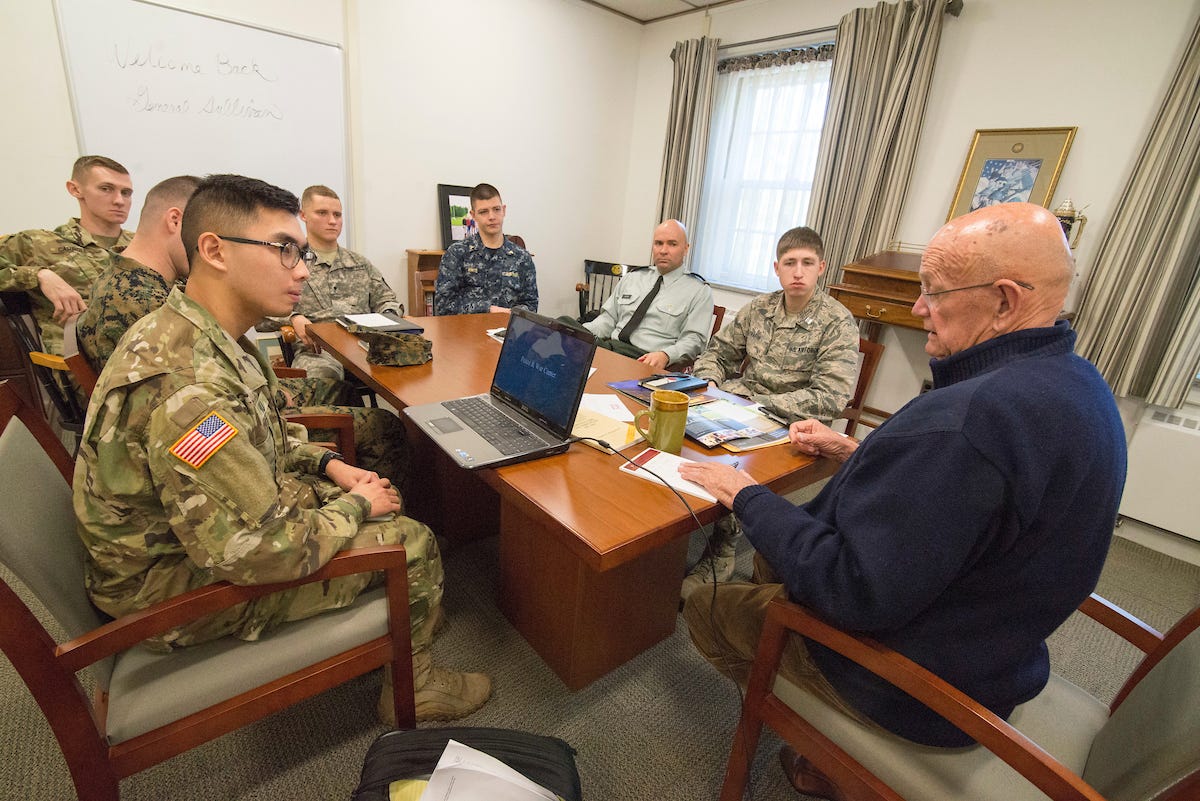This week, we finish our short series honoring the legacy of General Gordon R. Sullivan, Norwich University Class of 1959 and 32nd US Army Chief of Staff, who passed away on January 2, 2024. GEN Sullivan came to Norwich in 1955 from Quincy, MA. He studied History at Norwich while working in the mess hall and joining Sigma Phi Epsilon. Even though he spent several years at Norwich, Sullivan wasn’t convinced the military life was for him until he attended a summer camp at Fort Knox in 1958. While there, he fell in love with the Army.
This week’s tribute comes from Dr. Tara Kulkarni, founding director of the Norwich University Center for Global Security & Resilience (CGRS), and current CGRS director, Bill Lyons ‘90. GEN Sullivan’s 2016 Todd Lecture on “National Security Implications of Climate Change” helped launch the Center for Global Resilience and Security (CGRS), which bears his initials and researches the intersections of water, infrastructure, climate change, and energy from a national security perspective. He was the Distinguished Leader in Residence for CGRS through 2018 and received a lifetime achievement award from the Association of Environmental Health and Sciences Foundation in 2019 for his stewardship of environmental security.
By Dr. Tara Kulkarni
The legend of GEN. Sullivan is always in the air at Norwich University. Much has been written and said about his days at Norwich, his accolades in the defense of our nation, his leadership and his many, many contributions to the global community of soldiers, governments, think tanks, and scientists. My first impression of GEN. Sullivan was formed in an event in Milano Ballroom where I sat at one of the farthest tables, taking in my surroundings as a relatively new faculty member at Norwich. I was drawn to the way he interacted with a campus administrator, one of the few women in Norwich’s academic leadership chain at the time. It helped me put a real and human face on a legend. He did not seem intimidating at all, rather his kindness shone through his eyes and smiles making him feel approachable.
On February 5, 2015, GEN. Sullivan gave a presentation as part of the Todd Lecture series. His lecture, “National Security Implications of Climate Change,” may have impacted many, but it changed the course of my life. It helped Norwich launch the Center for Global Resilience and Security (CGRS), which bears his initials. I was named the founding director of CGRS and as CGRS’s Distinguished Leader in Residence at the time, Gen. Sullivan became my unexpected mentor. This all seems surreal even now, as a I often wonder about all the pivots and turns that life had to take to put me in the right place, at the right time to have the providence of becoming one of his many incredibly fortunate mentees.
In those years, I learned a lot about climate change and its intersection with national security. The engineer in me was always interested in the more pragmatic, solutions driven approach to addressing climate change, rather than through policy, and advocacy. However, in conversations with GEN. Sullivan and the networks he helped me build, I recognized the place of policy and science to drive action. I always knew that people are at the heart of all good engineering design and implementation, but GEN. Sullivan really underscored the value and power of stories in making any meaningful change. He had an incredible wealth of stories, sometimes featuring salmon and squirrels, and an uncanny ability to start and end in seemingly unusual places. He always connected the dots though, often forcing me to stop and re-think my assumptions, honestly confront what I thought I knew and ask new questions. He complained about scientists’ tendencies to get bogged down by specific numbers, challenging them instead to notice the trends and see the writing on the wall. His ability to take historic events, overlay the lessons from those onto current happenings and make predictions was a skill I deeply respected. It is the kind of skill that comes from experience, but more importantly, from an open mindedness, a willingness to admit mistakes and learn and adapt to new findings and perspectives. This humility radiated from GEN. Sullivan and is, I believe, a large part of his legacy. It is the one trait that I hope all our graduates can emulate. GEN. Sullivan truly cared about Norwich, and this was most evident in his love for our students.
One of my favorite examples of this is captured in a photo of GEN. Sullivan at the CGRS launch event. In a packed Milano Ballroom, filled with Norwich University faculty, staff, and students, as well as numerous external invited guests, GEN. Sullivan inspired those gathered with words of Vermont poet Robert Frost’s poem “The Sound of the Trees”. We then dove into conversations on climate change and resilience at multiple round tables. At each table, we had student note takers and recorders. Later, ten students lined up to summarize the takeaways from each group. GEN. Sullivan listened to each with rapt attention. I imagine he felt a sense of pride in his alma mater for being home to these incredible young people, who seemed to so effortlessly represent such big ideas; as well as in the young people themselves, recognizing that the world is in good hands, if these voices represented a slice of our future leaders.
GEN Sullivan opened so many doors for CGRS at places like the Woods Hole Oceanographic Institution and McKinsey. He helped CGRS find its footing in our early days and helped us build the environmental security initiative. He helped us invite impactful speakers to our events and build the momentum. He also inquired after me when I unexpectedly lost my mother a few days after that launch event. He wrote me a note when I earned my tenure and was promoted to an associate professor, and when I won the Dodge Award for Teaching Excellence. He pronounced my name correctly! He truly cared. There is a lot more I can say about GEN Sullivan, but words fall short. There truly is no language to describe all the many ways in which he has made my Norwich journey a unique and unforgettable one and for that and everything else that remains unsaid, I am deeply grateful.
By Bill Lyons ‘90
While attending a Norwich University Alumni Association Board meeting sometime around 2015, I remember President Emeritus Schneider asking our members what the “next big thing” was for Norwich to pursue from an industry perspective. Norwich had recently recognized significant achievements in the cyber field, and he wanted to position Norwich for the next big thing. Our members, who came from a wide range of backgrounds in industry and government, often served as a sounding board for the President.
After the meeting, in conversation with him, I told him that I thought climate change and climate security were a real opportunity, given our history in leadership, the physical sciences, military science, and industrial problem solving. He took mental notes. I was not sure if it was going to come to anything, but I was hopeful.
Not very long afterward, I attended General Sullivan’s now famous Todd Lecture Series presentation: "National Security Implications of Climate Change." I was absolutely awestruck by his presentation and his level of interest. He was so well versed on the topic and spoke with great clarity of purpose. As one of our most distinguished alums, having risen to the highest levels of military leadership, he validated my strong belief that this was an issue we should focus on. Apparently, General Sullivan agreed this was something to pursue!
Not long after that, I was invited to be a panelist for a session on climate security cohosted by the new Center for Global Resilience and Security (CGRS) and the Peace and War Center. To my astonishment, I was to be a panelist on the same panel as General Sullivan. I remember vividly his recitation of a poem about trees as part of his comments. Many of us were wondering how it all related to climate security, but after the poem, he masterfully brought everything together. As was his charm, General Sullivan found a way to bring complex things to a level that everyone could readily understand.
After that panel session, I had the honor of becoming one of the inaugural Senior Fellows of CGRS. The center had been named with General Sullivan’s initials in mind (Gordon R. Sullivan - GRS). He was a passionate, thoughtful advocate for the topic. If not for his advocacy, I am not sure CGRS would have been founded and flourished.
With great wisdom, the University had appointed Dr. Tara Kulkarni, a friend and mentor, to be the inaugural center director. This was the beginning of a friendship and collaboration that lasts to this day. We have collaborated on multiple papers and conference presentations on climate security since those early days.
Two years ago, Tara was elevated to the position of Associate Provost for Research and Chief Research Officer for Norwich. When she was promoted, Tara asked me to be her successor as center director. I was honored and accepted the charge. Two years on, I have enjoyed every bit of being a Director at CGRS.
When General Sullivan passed, I reflected deeply on how profound an influence he had on my trajectory in life. The research center named in his honor has provided me new purpose and direction. It has also brought me on campus as a member of the staff, which gives me great satisfaction. And it all began with a presentation to the Corps of Cadets in Plumley Armory. One more legacy to add to a lifetime of leadership, sacrifice, and humanity.








